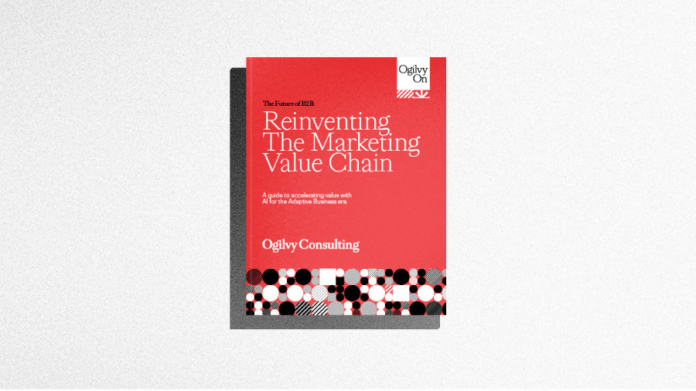A new report from Ogilvy Consulting delivers a stark warning to B2B marketers: incremental adjustments are no longer enough.
The future demands a fundamental reinvention. The Future of B2B: Reinventing the Marketing Chain argues that AI is not simply another optimisation tool – it is a transformative force set to reshape how businesses create and deliver value.
The report critiques the current state of AI adoption in B2B marketing, highlighting that only 5% of organisations can definitively link their AI investments to actual earnings. According to Ogilvy, this underperformance stems from a failure to go beyond experimentation and fully reimagine the marketing value chain from the ground up.
AI value accelerants: the engine of disruption
Ogilvy Consulting identifies three “AI value accelerants” as the core mechanisms driving this transformation, each set to replace long-established marketing conventions:
- Generative engine optimisation – Beyond traditional SEO, marketers must now create content that appeals to AI algorithms, ensuring discoverability in generative search and bot-to-bot interactions.
- Agentic AI-powered experiences – The static, linear customer journey is over. AI agents will deliver dynamic, hyper-personalised engagement, anticipating customer needs and guiding their path.
- Intuitive customer engagement – Mass marketing is being replaced by one-to-one messaging. AI’s predictive capabilities will ensure the right message reaches the right person with unprecedented relevance.
The five-step system: a blueprint for transformation
To help B2B marketers make this leap, the report outlines a five-step system designed to replace outdated processes with an AI-native value chain:
- Map your existing value chain – Document current marketing workflows to create a clear baseline and identify inefficiencies.
- Analyse pain points with precision – Isolate breakdowns and bottlenecks that limit value creation, and determine how marketing must evolve to overcome them.
- Assess AI value-add with foresight – Strategically evaluate where AI can eliminate friction, reduce waste, or unlock new performance levels using the full spectrum of capabilities.
- Remap your value chain with boldness – Design an entirely new process map that centres AI as the enabler of impact and innovation.
- Innovate relentlessly – View this not as a one-time exercise, but as a continuous effort to rethink, refine, and reimagine the value chain.
Beyond optimisation: from automation to value creation
The report separates AI transformation into two parallel tracks:
- AI-driven optimisation – Automating workflows, improving targeting, and streamlining content production for efficiency gains.
- AI-driven value creation – Using AI to build new customer experiences, develop product innovations, and generate predictive insights that offer a competitive edge.
It’s the latter, Ogilvy argues, that represents true disruption – and the biggest opportunity for long-term growth.
A call to action: transform or become obsolete
Ogilvy’s conclusion is clear: B2B marketing is at a crossroads. Those who embrace AI-driven reinvention will unlock new value streams and outpace their competitors. Those who cling to outdated models will be left behind.
The report urges B2B leaders to:
- Act now, perfect later – Begin mapping and identifying opportunities for immediate and long-term AI integration.
- Pilot and prove – Launch small-scale projects that demonstrate tangible value, using these results to justify wider investment.
- Scale and iterate – Expand adoption across the marketing chain, supported by robust change management and a culture of continuous improvement.
In short, AI is not just reshaping the marketing toolkit – it’s redefining the marketing function itself. B2B brands that fail to adapt risk becoming irrelevant in a world that is moving faster, thinking smarter, and demanding more.


 Whether you want to learn how to use LinkedIn, X or Facebook for marketing, or need to brush up on business skills like leadership, presentation skills or managing meetings, you will find something to enhance your professional skills with these on-demand courses.
Whether you want to learn how to use LinkedIn, X or Facebook for marketing, or need to brush up on business skills like leadership, presentation skills or managing meetings, you will find something to enhance your professional skills with these on-demand courses.